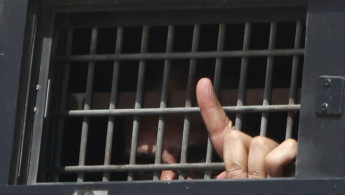Israel approves force-feeding Palestinian prisoners
The Israeli parliament approved Thursday a law allowing prisoners on hunger strike facing death to be force fed, a spokesman said. The move has sparked criticism from rights groups and medical experts.
The law seeks to prevent imprisoned Palestinian militants from putting pressure on Israel by refusing food. It was initially approved in June 2014 at the height of a mass hunger strike of Palestinian prisoners, during which dozens were hospitalised.
While the law does not specifically mention Palestinians, Internal Security Minister Gilad Erdan, who led the legislation, said it was necessary since "hunger strikes of terrorists in prisons have become a means to threaten Israel".
The law, which passed by 46 votes to 40, "will be used only if a doctor determines that the continued hunger strike will create an immediate risk to the life of a prisoner or long-term damage to his health," said David Amsalem of the ruling Likud party.
| The law is a way to provide "legal cover" to Israel's torture of prisoners. - Addameer, Palestinian prisoner rights group |
But opposition members decried the new measure, with the Arab Joint List of parties criticising "a law to torture Palestinian prisoners, aimed at uprooting their legitimate struggle".
The Israeli Medical Association called the law "damaging and unnecessary," stressing on Thursday its doctors would "continue to act according to medical ethics, which prohibit doctors from participating in torturing prisoners".
It said force feeding was "tantamount to torture".
Physicians for Human Rights Israel said the "shameful" law revealed the "anti-democratic face" of the Israeli parliament, saying they would continue to oppose the law and its implementation, and "support anyone who will refuse to obey the law".
Spokeswomen for both organisations said they were considering filing petitions at the high court against the law.
Palestinian prisoner rights group Addameer said the law was a way to provide "legal cover" to Israel's torture of prisoners, saying it would allow it "to kill more Palestinian prisoners on hunger strike" on top of the five who have died due to force feeding in Israeli prisons in the past.
According to the Association for Civil Rights in Israel, the majority of prisoners who go on hunger strike are Palestinians in administrative detention, under which they can be held for renewable six-month periods without charge.
A spokesperson for the Israeli Prison Service said there was currently one Palestinian being held on administrative detention and four "security prisoners" who had been on hunger strike for over a week.
Qaraqea reacts
Head of the Committee for Prisoners' Affairs Issa Qaraqea said on Thursday imposing the force-feeding law on prisoners on hunger strike was tantamount to legitimising murder.
He warned Israel the law puts the lives of prisoners at risk.
"Force-feeding is immoral and amounts to torture. Prisoners have died after being force fed, for example the three prisoners who died in Nafha prison in 1980."
This law contradicts international norms and conventions and it is the only one in the world that allows force-feeding, said Qaraqea, before calling on the international community to speak out against the new law.
He said the Israeli government, Prime Minister Benjamin Netanyahu, and all his ministers would be fully responsible for any detainee subjected to this law.





 Follow the Middle East's top stories in English at The New Arab on Google News
Follow the Middle East's top stories in English at The New Arab on Google News

![22 Arab countries at COP29 have rejected the targeting of fossil fuels [Getty]](/sites/default/files/styles/image_330x185/public/2024-11/GettyImages-2184289638.jpg?h=199d8c1f&itok=ptHl5bec)
![Dozens of people turned out for the funerals [Getty]](/sites/default/files/styles/image_330x185/public/2024-11/GettyImages-2185229760.jpg?h=e7c891e8&itok=1bctDcE6)